BBC Homepage
●Skip to content
●Accessibility Help
●Your account
●Home
●News
●Sport
●Earth
●Reel
●Worklife
●Travel
●
Search BBC
●
●
●
●
●
●
●
●
●
●
●
●
●
Close menu
BBC News
Menu
●Home
●Israel-Gaza war
●War in Ukraine
●India Election 2024
●Climate
●Video
●World
●Asia
●UK
●Business
More
●Tech
●Science
●Entertainment & Arts
●Health
●World News TV
●In Pictures
●BBC Verify
●Newsbeat
●Asia
●China
●India
Profile: Asif Ali Zardari
Published
Share page
About sharing
 Image caption,
Image caption,
Mr Zardari's mercurial career has taken many dramatic turns
Asif Ali Zardari is one of Pakistan's most controversial political figures who survived a series of personal and political setbacks to gain the presidency.
His is the first elected government in Pakistan to serve a full term.
But since taking the helm in September 2008, Mr Zardari has presided over an increasingly fragile country, a growing militant threat, a turbulent relationship with the US, an uneasy relationship with the military and nationwide flooding.
Furthermore a separatist insurgency in the south-west has not eased, and both the economy and the energy situation have worsened.
In May 2011 he had to cope with the fall-out in Pakistan of the killing by US special forces of al-Qaeda leader Osama Bin Laden in the town of Abbottabad.
Recriminations over the killings reflected the traditionally poor relations between his Pakistan People's Party (PPP) and the army as well as tenser relations with Washington, already strained because of continued US drone strikes against militant targets in the north-west of his country.
The fall-out from Bin Laden's death exposed the uneasy relationship between the PPP and Pakistan's military and intelligence services in the governance of the country.
During his period in power, Pakistan was hit by numerous suicide bombings - some directed against military and political targets and some more sectarian in nature. Because of militant attacks, the PPP has been all but unable to campaign for the general elections due on 11 May.
Among the many opponents ranged against him are some of the country's most popular politicians, including former PM Nawaz Sharif and more recently former cricketer and Movement for Justice party leader Imran Khan.
Both have been critical of President Zardari's support for the US and Nato in the battle against Taliban militants in Afghanistan.
Yet in spite of the wide array of problems he faces, President Zardari has remained doggedly in position - outlasting Prime Minister Yousuf Raza Gilani who in 2012 was forced out of office after the Supreme Court convicted him of contempt for failing to pursue a corruption case against the president.
Controversial memo
Mr Zardari's mercurial career has taken many a dramatic turn since his marriage in December 1987 to the charismatic former Prime Minister Benazir Bhutto.
 Image caption,
Image caption,
Militants have made it difficult for Pakistan's secular politicians to campaign in public for 2013 elections
He was thrust into the centre of politics when Ms Bhutto was assassinated 20 years later.
Since then and now his career has veered from being imprisoned for corruption - complaining that he was tortured when behind bars - to taking the country's top job by leading the PPP to victory in general elections after his wife's death.
Perhaps the high point of his political life came in 2008 when he played a pivotal role with former political enemies to force President Pervez Musharraf to resign.
But he has also been the subject of unfavourable scrutiny - in 2010 he was widely criticised for visiting Europe at the height of some of the worst floods to hit Pakistan in recent years.
In November 2011 he was dealt another blow by the resignation of Pakistan's ambassador to the US, Husain Haqqani.
Both Mr Haqqani and the president were accused of drafting a controversial memo in which they allegedly sought US military help against a possible military coup in Pakistan. They denied the charges.
Prison sentences
But his political struggles today are still a far cry from the period before Ms Bhutto's death, when Mr Zardari's public image was so bad that the PPP kept him out of the public eye as much as possible during the campaigning for national elections in February 2008.
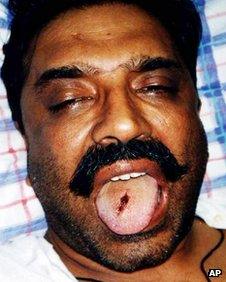 Image caption,
Image caption,
Mr Zardari claimed that he was tortured while in prison in 1999
Mr Zardari was seen then as a political liability.
He spent several years in jail on charges of corruption. He was labelled "Mr 10%" for all the kick-backs he is alleged to have received.
He found himself in major trouble in 1990 when he was accused, among other things, of tying a remote-controlled bomb to the leg of a businessman and sending him into a bank to withdraw money from his account as a pay-off.
Those charges were never proved. The PPP had then accused the country's powerful intelligence apparatus of maligning Mr Zardari to damage Ms Bhutto's image.
In 1993, when then President Ghulam Ishaq Khan sacked the government of Prime Minister Nawaz Sharif, Mr Zardari was escorted from the prison straight to the presidency where he was sworn in as a minister in the interim government.
Later, when the PPP won the 1993 elections, Mr Zardari moved with his wife to the Prime Minister's House in Islamabad where he lived for the next three years.
In 1996, when another president sacked the PPP government, he was arrested and charged with a number of offences including the murder of Mir Murtaza Bhutto, his wife's brother.
He was later charged, along with his wife, and convicted in a kickbacks scam involving a Swiss company, SGS.
But a mistrial was declared by Pakistan's Supreme Court following a major scandal involving the accountability bureau and the judge who had issued the verdict.
His last prison sentence lasted eight years until 2004, during which time he says he was tortured.
It ended as the then General Musharraf was engaged in protracted negotiations with Benazir Bhutto, then in self-imposed exile, for some form of political reconciliation.
'Personal bravery'
Mr Zardari resolutely stood by his party as well as his wife - although at times he disagreed with the politics of both.
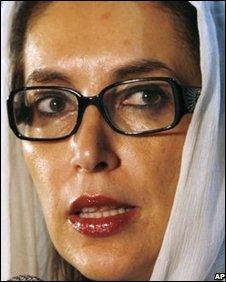 Image caption,
Image caption,
Benazir Bhutto's death propelled Mr Zardari on to centre stage
His friends say this was entirely in character and that no-one can deny his personal courage.
A close friend recounts an incident in the 1980s when as a horse-riding bachelor he personally rescued the daughter of a German diplomat who had fallen into a bog with her horse.
Asif Ali Zardari was born in Karachi to Hakim Ali Zardari, head of one of the "lesser" Sindhi tribes, who chose the urban life over rustic surroundings.
He grew up in Karachi and was educated at St Patrick's School - also the alma mater of Pervez Musharraf.
The young Zardari's main claim to fame was that he had a private disco at home, helping him gain the reputation as a "playboy".
After his release from prison in 2004, Mr Zardari kept a low profile, undergoing medical treatment in the US.
In addition to his heart problems he is reported to suffer from diabetes and a spinal ailment - which sometimes prevent him from easily moving around.
Ms Bhutto appreciated her husband's loyalty, saying that "despite his failings, he always stood by his family no matter what".
Related Internet Links
Pakistani government
Pakistan People's Party
The BBC is not responsible for the content of external sites.
Top Stories
Live.
Tories pledge another National Insurance cut ahead of manifesto launch
Labour promises 100,000 urgent child dental appointments
Published
2 hours ago
What's the real distance between Sunak and Starmer on climate?
Published
2 hours ago
Features
Five ways Michael Mosley made us healthier

Poachers target city's junk food-eating fish
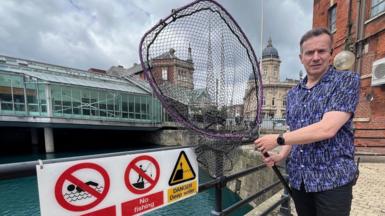
The Papers: 'Tories offer lower taxes' and blood donor 'red O-lert'

Who can I vote for in the general election?

'It's a lovely place but we can't afford to live here'

UK weather: Where is summer?

Drugs, alcohol and a gun: Inside Hunter Biden's trial
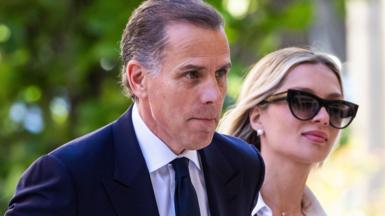
Why the EU might be about to make Chinese electric cars more expensive

It is what it is - boys, 12, on Snapchat after murder
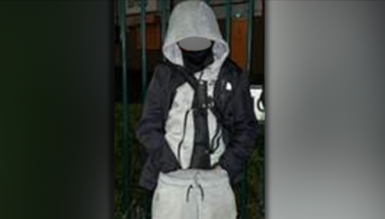
Elsewhere on the BBC
The life and legacy of a trailblazing comedy icon
Writer Max Kinnings pays tribute to comedian Rik Mayall, featuring unheard recordings

Your first glimpse of the highly-anticipated series
Based on Holly Jackson’s hit novels, A Good Girl’s Guide to Murder is coming soon to iPlayer

Martin Freeman launches readings from an Orwell classic
Also featuring special readings from Tom Hollander, Juliet Stevenson and more
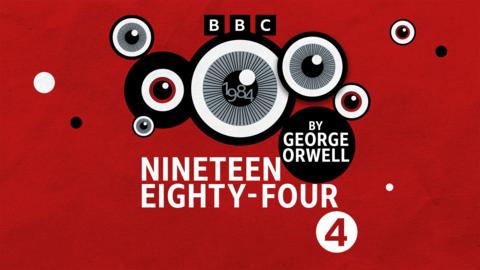
Bringing history alive through powerful, rare recordings
This is the story of D-Day, told by those who were there

Most Read
1
The town struggling to see a doctor
2
Five ways Michael Mosley made us healthier
3
Singapore Airlines turbulence victims offered payouts
4
Poachers target city's junk food-eating fish
5
'Tories offer lower taxes' and blood donor 'red O-lert'
6
Unemployment rate highest for more than two years
7
'It's a lovely place but we can't afford to live here'
8
Four US college instructors stabbed in public park in China
9
It is what it is - boys, 12, Snapchat after murder
10
Apple brings ChatGPT to iPhones in AI overhaul
BBC News Services
●On your mobile
●On smart speakers
●Get news alerts
●Contact BBC News
●Home
●News
●Sport
●Earth
●Reel
●Worklife
●Travel
●Culture
●Future
●Music
●TV
●Weather
●Sounds
●Terms of Use
●About the BBC
●Privacy Policy
●Cookies
●Accessibility Help
●Parental Guidance
●Contact the BBC
●Get Personalised Newsletters
●Why you can trust the BBC
●Advertise with us
© 2024 BBC. The BBC is not responsible for the content of external sites. Read about our approach to external linking.






 Poachers target city's junk food-eating fish
Poachers target city's junk food-eating fish
 The Papers: 'Tories offer lower taxes' and blood donor 'red O-lert'
The Papers: 'Tories offer lower taxes' and blood donor 'red O-lert'
 Who can I vote for in the general election?
Who can I vote for in the general election?
 'It's a lovely place but we can't afford to live here'
'It's a lovely place but we can't afford to live here'
 UK weather: Where is summer?
UK weather: Where is summer?
 Drugs, alcohol and a gun: Inside Hunter Biden's trial
Drugs, alcohol and a gun: Inside Hunter Biden's trial
 Why the EU might be about to make Chinese electric cars more expensive
Why the EU might be about to make Chinese electric cars more expensive
 It is what it is - boys, 12, on Snapchat after murder
It is what it is - boys, 12, on Snapchat after murder

 Your first glimpse of the highly-anticipated series
Based on Holly Jackson’s hit novels, A Good Girl’s Guide to Murder is coming soon to iPlayer
Your first glimpse of the highly-anticipated series
Based on Holly Jackson’s hit novels, A Good Girl’s Guide to Murder is coming soon to iPlayer
 Martin Freeman launches readings from an Orwell classic
Also featuring special readings from Tom Hollander, Juliet Stevenson and more
Martin Freeman launches readings from an Orwell classic
Also featuring special readings from Tom Hollander, Juliet Stevenson and more
 Bringing history alive through powerful, rare recordings
This is the story of D-Day, told by those who were there
Bringing history alive through powerful, rare recordings
This is the story of D-Day, told by those who were there
